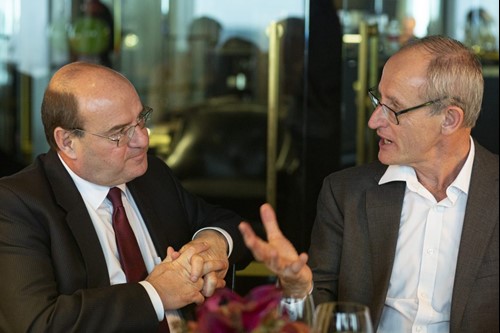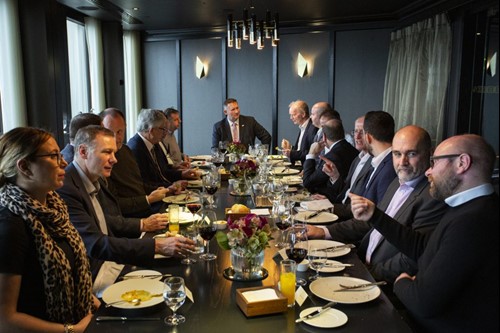Delegates to the PFM roundtable, sponsored by Salisbury Group, enjoyed an in-depth discussion and proposed solutions to many of the FM sector’s long-term issues.
With numerous issues continuing to impact on the FM sector in general, with others requiring consideration for the various specialist sectors within this, there is never a shortage of topics to debate when gathering senior representatives together and this proved to be the case for the latest PFM roundtable discussion.
This was emphasised from the opening comments from delegates, which consisted of client-side FMs, two consultants and four service provider representatives.
One of the most frequently-heard calls in recent years is for more appreciation of the value provided by FM and this also proved to be the first main point of debate on the day.
While recognising that a fine balance has to be maintained in providing sustainable solutions and services, delegates also discussed the need for higher levels of integrity and, where necessary, imagination to ensure that increased value could be achieved.
In addition to the need for service providers to understand the needs of clients and facilities users, achieving improved outcomes also required clients to apply more thought to create meaningful service level agreements (SLAs) to assist with this.
One of the elements essential for the delivering of improved value and outcomes was identified as working in partnership by clients, their various departments and service providers.
With both judges and winners of the PFM Partnership Awards included among the delegates, there was general agreement that collaborative working can deliver improved outcomes for all those involved.
In order to achieve this method of working together it was necessary for strategic relationships to share values and as many aspects of their business cultures as possible.
One of the issues to overcome was identified as over-enthusiastic sales pitches from service providers who would then struggle to deliver on the promises made, combined with the need to avoid short-term contracts wherever possible.
Methods of achieving improved collaborative working relationships were also discussed, including the ISO 44001 standard launched two years ago.
Although many of the companies represented on the day showed enthusiasm and appreciation for partnership working, they had not taken the extra step of achieving accredited status for this, as yet.
Additional thoughts were shared on the need to recognise the attributes and skills of all team members, which was seen to have been overlooked when service provision focused on cost. This was seen as another important reason to further endorse the need for more focus on value.
Another topic receiving enthusiastic support from delegates within the roundtable debate was the consideration required by all those involved, including clients, FM teams, service providers and industry partners, to provide a united front and encourage improved behaviours from facilities users.
It was also suggested that applying a simple maths equation should be considered to illustrate the benefits of working more collaboratively and explain these to team members and interested parties, which involved the dividing of value by the cost involved.
In order to assist with delivering improved levels of working in partnership, it was essential to establish in-depth understanding of all the assets within each facility, it was stated. This would provide valuable assistance in helping all team members to realise what was required and expected to be covered within the terms of the contract.
 Salisbury roundtable was held in Vertigo42 bar in Tower 42, London
Salisbury roundtable was held in Vertigo42 bar in Tower 42, London
The next essential element to appreciate was explained as making sure that everyone involved understood that each contract is designed to achieve the necessary outcomes.
While including some of the ‘softer’ issues around collaborative working was also important, unless these are focused on delivering the correct level of consequences it would be unlikely that all other efforts would combine in the best manner, which could make renewals difficult at the end of contract completion.
Further to the above, the issue of recruiting new staff was discussed, with the emphasis on finding additional staff with the necessary skills and attitude to assist the business and its clients with achieving their aims.
Although there was general agreement that there are insufficient numbers of skilled workers, it was stated that the FM sector has struggled to attract the right calibre of people due a lack of understanding of the industry and the many employment opportunities available.
With FM receiving growing appreciation for the way it plays an important and often leading role in delivering and maintaining workplaces that assist companies in their efforts to retain staff and realise an improved return on investment, paying careful attention to recruiting the best people was another factor identified as having the potential to provide long-term value in a number of areas.
At this point in the discussion, the thoughts of delegates turned to the issue of the tendering process and how this should be approached and understood.
In addition to avoiding an almost automated response to new tenders by devoting greater effort to gain more appreciation of what these were designed to achieve, all tenders should be focused on providing a level playing field for applicants wherever possible.
The costs should be analysed before tenders are submitted to allow the bid to be formulated accordingly, it was stated. Further to this, the need to consider opportunities for innovative practices was proposed, particularly if these could assist in driving efficiencies and reducing cost without detracting from the important aim of focusing on value.
Once these elements had been put into place, effective methods should be applied to allow all practices to be measured and provide greater understanding of both the successes achieved and the elements and areas that required further attention and effort.
With data capture and generation becoming ever easier and, in some cases, prolific, the question of ownership of the data was raised.
Clients should not feel that their data was being repackaged and effectively “sold back to them”, it was stated, and this should be used by client and service provider to identify where operations could be improved or made more efficient, which often has the additional benefit of reducing cost.
While it is important to appreciate that all technology is only as good as those using it, delegates agreed that effective measurement and management was impossible without having efficient data gathering and analysis methods in place.
 PFM roundtable, sponsored by Salisbury
PFM roundtable, sponsored by Salisbury
As the close of the discussion approached, thoughts returned to the issue of delivering a disciplined approach to working in partnership with others through the application of accredited standards.
Where companies had achieved standards including ISO 9001 and ISO 14001 and others, this could easily be used to apply for accreditation for collaborative working, it was stated. However, the level of effort and expense involved for each accreditation was seen as prohibitive by some delegates, leading to comments on the need for these to be made more accessible.
Following the close of the discussion, there were many positive comments from delegates shared on a personal basis and via both LinkedIn and Twitter social media accounts expressing appreciation for the opportunity to be involved and the high level of debate throughout.
“We were pleased to sponsor this important round table and it proved to be an excellent debate between the participants. Discussions in FM often focus on the negative aspects, so it was good to discuss the value our industry offers to clients and the ways in which we can move it up the value chain. Of particular importance was the focus on enhancing outcomes for all contracting parties. That should be our focus from the procurement stage through to steady state operations because it is one of the tangible benefits of developing a strong partnership culture,” said Salisbury Group managing director, sales and marketing Nick Platt.
DELEGATES
Mike Wingrove, head of facilities, Dentons UK & Middle East
Mark Coupe, head of FM & senior director, BNP Paribas Real Estate
Andy Bradshaw, director of property & workplace, DLA Piper
Alex Walters, facilities manager, The Office Group
Matt Coulson, chief executive officer, Chiswick Park-Enjoy Work
James Fitzpatrick, managing director, Boden Resource
Simon Francis, principal lead of estates, Zoological Society of London
Ciaran Barry, managing director, Finbarr Solutions
Ian Wade, head of estates, British Medical Association
Paul Teasdale, chief executive officer, PTSG
David Hawkins, chief operating officer, Institute for Collaborative Working
Brian Boundy, director of operational policy and support, intu property services
Derek Rossenrode, general manager, The Shard
Arty Shaw, M&E director, Salisbury Group
Nick Platt, managing director, sales and marketing, Salisbury Group
Kelli-Anne Horne, sales manager, PFM Magazine
Chaired by Dennis Flower, editor, PFM Magazine
